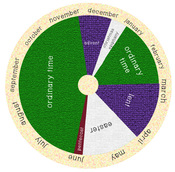|
31 At that very hour some Pharisees came and said to him, "Get away from here, for Herod wants to kill you." 32 He said to them, "Go and tell that fox for me, 'Listen, I am casting out demons and performing cures today and tomorrow, and on the third day I finish my work. 33 Yet today, tomorrow, and the next day I must be on my way, because it is impossible for a prophet to be killed outside of Jerusalem.' 34 Jerusalem, Jerusalem, the city that kills the prophets and stones those who are sent to it! How often have I desired to gather your children together as a hen gathers her brood under her wings, and you were not willing! 35 See, your house is left to you. And I tell you, you will not see me until the time comes when you say, 'Blessed is the one who comes in the name of the Lord.'" Luke 13:31-35 NRSV Our scripture today hits me.. Let’s take it apart.
Now earlier in scripture Luke makes a point to say that Jesus was still travelling. The end goal was Jerusalem. In our scripture for today, he is currently in Galilee, which is ruled by Herod. When we think Herod we often think of the baby killer in the beginning of Matthew. This is not the same guy. The Herod in Matthew was incredibly narcissistic. He named multiple children, including females after himself. This Herod is one of his sons. This is the son that beheaded John the Baptist and married his own niece. (The apple doesn’t fall far from the tree, right?) Anyway, this Herod had no desire to kill Jesus. In actuality, he just wanted to see him. Eventually, when Jesus was arrested, Herod finally gets his chance, and sends him back to Pontius Pilate. So why are the Pharisees telling Jesus to leave, or Herod will kill him? He was already headed out of town, and Herod had no desire to kill Jesus? Because, like many things the Pharisees did, it was a trap. Jesus was a known prophet. If he ran from Herod it would look like he didn’t have God’s power behind him. Therefore, he would appear as a false prophet. If he faced Herod to speak with him, it would make a people who were already angry with Herod (he was the guy who used the temple tax to put a Roman Eagle at the entrance to the rebuilt temple) they would be enraged with Jesus. Like all the other traps, this one looked impossible to break free from. Jesus’ response is interesting to me. First, I believe he gets angry, or at least frustrated. I say this, because a fox was not one of the good animals to be associated with. In his frustration he defuses the bomb. He’s not running out of town. He’s not seeing Herod. Instead he basically says, “I have work to do. We both know nothing is going to happen. Leave me alone.” I don’t know if I’m alone here, but when I’m frustrated it tends to spill over into other areas. Like, I might be frustrated a project I’m working on isn’t going the way I want. Well, then I recall other projects that didn’t work. Sometimes that leads to getting frustrated at things that don’t deserve my frustration. Like, I might unfairly get frustrated at the ones I love, and that usually leads to me apologizing. Jesus’ frustration spills over to Jerusalem. The city that “kills the prophets, and stones those that are sent to it.” See that phrase at the top of the page? When one feels sorrow instead of anger, you are on the Christian path. In Jesus’ frustration, he begins to lament the very people who would eventually kill him. Most would react a bit different than Jesus did. A group of people want you dead, you call those people your enemy. A group of people don’t want to listen to what you have to say, and just call you a liar, you unfriend them. In an act of radical love, Jesus still wants them to be included in God’s family. It’s a lamentation. He is literally walking to his death, and he is weeping for those who will crucify him. What do we do with that? We have to find that sorrow for those who have hurt us. Why? Often times, the ones who have hurt us are hurt too. There comes a time where it is more important to do what is right than what is fair. It’s not easy. Easy is biting back, taking revenge, or living in the pain of the past. There comes a time where we are called to that radical love of forgiveness: When we end that cycle of brokenness and abuse, so we don’t end up being the ones who hurt someone in the future. When we weep for those who haven’t found that true peace yet. When we no longer see enemies, or outsiders, but simply people who haven’t accepted God’s love in the Body of Christ. It’s accepting our ability to wound others; in our imperfection, we are fallen creatures. We try our hardest to follow God’s will, but our hardest will never be perfect. It is in our own humility we can find forgiveness for others. You cannot change who you were. You can only make actions now, to try to live into God’s purpose. It’s a purpose that doesn’t belong to me, or you. It’s God’s plan, and it requires letting go. Let go. It’s time. This is one of those pieces of traditional church that one could easily miss. However, if you know what you are looking for, you can immediately tell if the church will do certain things during their worship. (i.e. do a call to worship.) While not a promise, a church that follows the liturgical calendar will present colors for each of the seasons. They will do this by covering the place where the worship leader, and pastor will speak. They will also drape the communion table. Back when I told you what to expect from meditations, I told you what each of these colors mean. Today, I want to tell you about each season: The Calendar begins with Advent. Advent is the preparatory time before Christmas. You know you are preparing for something because the colors will be purple. (Or sometimes light blue.) Often, Advent Calendars begin December 1. However, Advent actually begins the four Sundays before Christmas. More on Advent later. Next is Christmas. Christmas only begins on December 25th. You know that song, the 12 days of Christmas? Well, that's how long Christmas lasts. It's called Epiphany, and symbolizes the wait between the birth and when the Magi showed up. This leads in to Ordinary Time. Ordinary time happens twice in a Christian year. There are no grand celebrations or events during this time. It's a time of hope and reflection. Let's call it pasture time, since the green symbolizes green grass. Next is Lent. Lent begins the 40 days before Easter, excluding Sundays. Like I mentioned above, it's purple, so it's a time to prepare. We should be getting in touch with our mortality, and our sinful nature. Seriously, I've read at least three pastoral blogs saying we should put aside the ashes of Ash Wednesday (I wrote both about Lent and Ash Wednesday just last week.) because Jesus' life is all about the celebration of Easter. I couldn't be more frustrated with a sentiment related to the Christian Calendar. The Resurrection is only as beautiful as the death is tragic. Lent prepares us to accept that there is always something about us that needs to die. We live in that tragic death, until we accept the new life in Christ. This, of course, leads to Easter. Like Christmastime, we enter an Eastertime. Easter is the celebration of new life through Jesus Christ. This is the highest, most important time in the Christian year. It can only be so important because of everything that has happened before it. Easter ends, and brings us to Pentecost. It is the celebration of the Holy Spirit lighting on the Disciples. At Pentecost we remember the Disciples became Apostles. (These are words saying the students became the teachers and leaders.) This leads us back to Ordinary or Pasture time, where we hope until a new year begins again with Advent. If you like what you are reading there are many ways to connect:
And as always, contributions are greatly appreciated. The collective church is really bad at explaining things. There are times when we stand, sit, kneel. There is a specified cadence to our collective speak. We have front doors that, for no apparent reason, remain locked, and back doors that are the secret front door for congregants. Then we don't explain any of it. It's no wonder visitors have no idea what's going on, much less congregants!  Click for bigger image Click for bigger image Lent is a season in the Christian Calendar. (That round thing to the left. That's the Christian Calendar.) There are special days Christians observe, like Easter or Christmas. Those days usually fall within seasons. Easter is actually it's own season. (More on that later.) Lent too is it's own season. It begins Ash Wednesday, and lasts 40 days, excluding Sundays, leading up to Easter. Lent is wilderness time. It is 40 days to help us recall the Israelites 40 years and Jesus' 40 days in the Wilderness. It is a time where we get back to basics and let go of the things that are not needed. For many Christian traditions it's a time of fasting. For others, it's a time to take up a Christian practice, or let go of a bad habit. Lent concludes with Holy Week, Holy week begins after Palm Sunday and includes: Maundy Thursday, Good Friday, and Holy Saturday. It is the darkest time of the Christian Year because we remember the Crucifixion of Christ. Some Christian Traditions strip the liturgical colors from the church for these few days, or put up black liturgical colors. This Lenten season, we are looking at different parts of Christian tradition. Next week we will look closer at the liturgical colors. What do they symbolize, and why do we use them? A congregant, about a year ago, expressed a desire to understand different elements of Christianity better. Therefore, throughout Lent, we will be taking a closer look at explaining why many Christians do what they do. Ash Wednesday is the beginning of the season of Lent. (More on Lent tomorrow.) There is a symbol used during this day, it's an ashen cross put on the forehead. The ash symbolically comes from the dried palms of the previous year's Palm Sunday. (Yeah, we will get to that one too.) The palms are burned into an ash, then mixed with holy water, or anointing oil. It's a symbol of our mortality. From the ashes we have come, and to the ashes we will return. Ash Wednesday puts us in the right frame of mind to accept the journey we are about to take to get to Easter. If you like what you are reading there are many ways to connect:
And as always, contributions are greatly appreciated. A congregant, about a year ago, expressed a desire to understand different elements of Christianity better. Therefore, throughout Lent, we will be taking a closer look at explaining why many Christians do what they do. Today we will be talking about a very popular day on the Christian calendar. For some, they call it "Shrove Tuesday." For many, they call it "Mardi Gras." I call it, today! No matter what name you know it by, it concludes Epiphany with a bang! (More on that season later.) Shrove Tuesday is the day before Lent begins. Since Lent is often known as a season of fasting and preparation, Shrove Tuesday is the preparation for that. One of the items one shouldn't use during Lent is yeast. Yeast has a shelf life, therefore, you will see Churches announce Pancake dinners this time of year. True, many my age or younger wouldn't know what to do with a yeast packet (and most of us use premixed pancakes.). It is still symbolic of using up that yeast before Lent. In other traditions some want to use up more than their yeast. They also want to use up their access energies. Thus we have things like Mardi Gras. To put it bluntly, Mardi Gras has become a time to use up ones indiscretions before they become pious for Lent. No, this isn't true for everyone. In fact, in some ways Mardi Gras has become a family event. Basically, Shrove Tuesday can be summed up in this way: As Lent prepares us for Easter, Shrove Tuesday prepares us for Lent. Come back tomorrow as we discuss Ash Wednesday. If you like what you are reading there are many ways to connect:
And as always, contributions are greatly appreciated. Jonah 1:12 He said to them, “Pick me up and hurl me into the sea! Then the sea will become calm around you. I know it’s my fault that this great storm has come upon you.” (CEB) I was taught Jonah was possibly the only successful prophet. He told the people to turn from their ways, and they turned from their ways. True, they were the enemy of the Israelites. True, Jonah was more invested in the people being destroyed in a righteous fire. Eventually, he did what he was told, and the outcome was good. (Side note: I personally believe the sign of a successful prophet is telling God's wishes. Period. It is then up to the people to decide if they want to listen to the prophet.) Congregants and ministers alike struggle with what to take away from Jonah. He fought God. He didn't really give his best once he consented. What is there to learn from this guy? Giving up. He was stellar at it. I'm not talking about giving up where God wants you to hang on. You know, when God calls you to a Nineveh, and you book it to Tarshish instead. I'm talking about giving up when it's best for everyone else. Giving up when it might hurt you. That's what Jonah was good at. Sometimes, we don't know when to let go. We are not comfortable with uncertainty, and when God is calling us to it, we tend to hang on a little tighter. The ship might go down, but darn it, we hung on for as long as we could. Having the foresight, trust, and humility to know when to let go and jump into the unknown is a spiritual practice. We should embrace it when it comes upon us. I would love to hear from you. There are several ways to communicate and connect:
Join Fig Tree's Subreddit Follow our Pinterest page Like us on Facebook Follow us on Twitter |
Categories
All
Archives
October 2023
|









 RSS Feed
RSS Feed